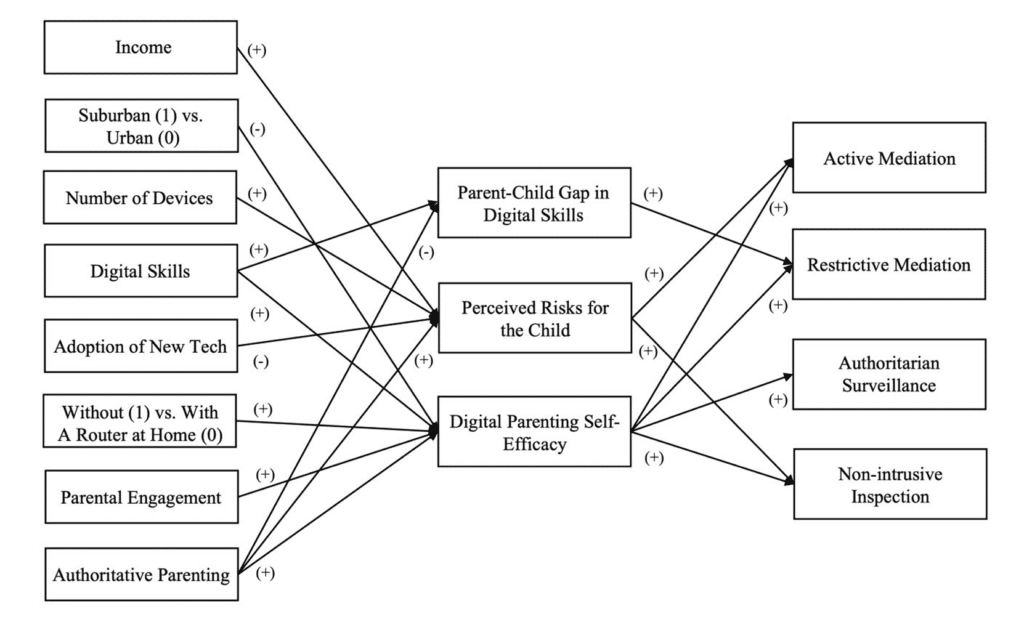Study Investigates Differences in Parent Approaches to Children's Online Activities
Justin Hendrix / Sep 6, 2023Justin Hendrix is CEO and Editor of Tech Policy Press.
A wave of child online safety legislation is sweeping the United States. Some laws, such as the California Age Appropriate Design Code Bill, address design and privacy concerns, putting the onus on the platforms to make their products safe for children. Laws in other states, often led by Republicans, put more emphasis on the role of parents.
One example of the latter is Utah's SB0152, known as the Utah Social Media Regulation Act. The law, which passed in March, requires that tech firms verify the age of users, requires companies to get parental consent for a child to have a social media account, and puts other restrictions on accounts held by minors, such as prohibitions on direct messaging, advertising, and the collection of personal data. The law enacts a social media curfew between 10:30 p.m. and 6:30 a.m., unless that restriction is adjusted by a parent or guardian. And, perhaps most controversially, the law gives parents and guardians the right to access a minor’s account, including direct messages.
Even as lawmakers introduce such measures, there remain unanswered questions about the role that parents can play in mediating the safety of children online, and the factors that affect how parents in different circumstances recognize and approach the problem in the first place.
For instance, to what extent are parents prepared to mediate their children’s online affairs at all? How do parental strategies with regard to social media differ, and how do economic, cultural and social differences between parents impact their readiness to help children use the internet and social media safely? And what can the answers to these questions tell us about what types of parental interventions may produce better outcomes for children and families?
Researchers Pengfei Zhao and Natalie Bazarova at Cornell University and Natercia Valle at the University of Florida in Gainesville set out to address these and related questions by surveying a nationally representative panel of parents of children between the ages of 10 and 17. The results were reported in a paper published in the Journal of Computer-Mediated Communication this week.
The survey of 530 parents assessed the respondents' economic capital (such as income, employment status, access to the internet, and number of devices in the home), cultural capital (such as the parents’ level of educational attainment and digital skills), and social capital (such as marital status, number of children in the household, and measures of parental involvement and parenting style).
Then, the researchers looked at other important factors, such as how the parents perceived the risks and benefits of social media, and how the parents approached mediating their children’s use of technology. Using a previously developed taxonomy of approaches, the researchers were able to characterize respondents’ parenting strategies, including:
- Active mediation- “discussing social media with children and guiding them on the appropriate use of social media”
- Restrictive mediation- “setting rules on the time children spend on social media and related activities”
- Authoritarian surveillance- “monitoring and checking children’s social media activities by requesting their passwords and logging on to their accounts”
- Nonintrusive inspection- “surveilling children’s social media activities by checking their public posts, comments, and statuses on social media profiles.”
The researchers allow that “some parents are highly involved in several strategies simultaneously,” while others are “minimally involved in any of them.” Various parental factors, “such as income, digital skills, perceived social media benefits and risks, differentiate the use of specific strategies,” study author Pengfei Zhao said in a tweet. The researchers depict the relationships between the various parental capital factors and the deployment of various strategies.

For instance:
Parents with a higher household income, more authoritative parenting, and more devices at home use both active mediation and nonintrusive inspection, as they are more aware of social media risks. Conversely, parents more open to new technology are less concerned about social media risks and, consequently, engage less in active mediation and nonintrusive inspection. Similarly, spending more hours together is associated with lower concerns about risks and less active mediation.
And in another example:
Parents with lower incomes tend to perceive fewer social media risks and, as a result, underutilize active mediation. Instead, they tend to rely on authoritarian surveillance and nonintrusive inspection.
In general, the researchers find that “family communication patterns” have a lot to do with the ways parents regulate their children’s use of technology- and these patterns are often related to parental capital. The study presents “opportunities for parental interventions and training programs to enhance parental knowledge of social media risks, digital skills, and digital parenting self-efficacy,” and suggests that such interventions and programs should take into account that what may be optimal for one family may not be optimal for another.
Almost 10% of parents in the sample, however, report being “minimally involved in any mediation strategy,” a result the researchers call “concerning.”
Whether lawmakers advancing legislation that would seem to empower more authoritarian, intrusive approaches to parental mediation may pause to consider the complexities of these relationships is an open question, as is whether the types of affordances and requirements created by such legislation will impact the choices that parents make and how they deploy various mediation strategies to keep their children safe online. More science will be necessary to arrive at answers- and more communication between scientists and lawmakers will be necessary to arrive at better laws.
Authors

